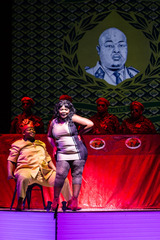| Opera Reviews | 28 April 2024 |
A thoughtful and moving take on Verdi's Macbethby Steve Cohen |
|
Verdi/Cassol: Macbeth |
|
|
Almost eighty years later, Brett Bailey and his avant-garde theatrical group from South Africa have taken that same Scottish play and transplanted it to the Congo with an all-black cast. He has done even more. Bailey conceived, designed and directed, taking not only Shakespeare’s plot but also the Italian words written by Francesco Maria Piave and music composed by Giuseppe Verdi for the Florence Opera in 1847. Then saxophonist Fabrizio Cassol re-arranged the music for African instruments and changed some of the rhythms. While the words were sung in Italian, the projected text was translated into contemporary English that described the usurpation of power by a strongman who is prey to superstition, called Colonel Macbeth. The rivalry of Scottish clans has been replaced by the tribal warfare of Hutus versus Tutsis which caused more than five million deaths, and drove two million people to flee as refugees. This re-interpretation is a joint production of Opera Philadelphia and Bailey’s theatrical organization from Cape Town, South Africa, called Third World Bunfight. Their Macbeth has been cut to 90 minutes as if with a sharp machete, eliminating many characters and focusing on Macbeth and his wife and their co-dependency as they claw their way to power, use slave labor to loot gold and tantalite mines, and then try to avert the fatal ending that’s foretold by witches. Now, I am a traditionalist who normally resists radical change. One of my favorite Verdi melodies is the joyous march that the composer wrote as the finale, where the chorus sings in 4/4 time, “Macbeth, Macbeth ov'è / Dov'è l'usurpator” (basically, “And now, Macbeth is dead / At last, Macbeth is dead.”) Bailey and the musical director Cassol cut that out and replaced it with a repeat of the sad, slow chorus “Patria oppressa” (“Oppressed homeland”) that Verdi composed for Scottish refugees at the beginning of his last act. This production also used a portion of the Oppressa melody in place of Verdi’s overture. It clearly was the theme of this interpretation. I have to admit that the new ending is more appropriate. I am satisfied to say goodbye to my happy march as I am moved by the parallel with central Africa and its ethnic conflict, ruthless militia, atrocities, and plundering of minerals. I even suspect that Verdi, if he had adapted this Shakespeare play in his mature years (as he did four decades later with Otello and Falstaff), might have chosen to end on this tragic note. The leads were legitimate singers from the Cape Town Opera. Nobulumko Mngxekeza as Lady Macbeth sang better than some sopranos I’ve seen and heard in that role at major houses. Owen Metsileng, who describes himself as a tenor, was strong in the baritone role of Macbeth, with gleaming top notes. Otto Maidi was a sympathetic Banquo. The seven-person chorus sounded much more powerful than you’d expect from its numbers. Some of the highlights of this version displayed Verdi’s melodies and rhythms relatively untouched, as in Banquo’s aria, Macbeth’s two last-act arias and, especially, the Lady’s sleepwalking scene. The banquet scene made a particularly vivid impression with almost no change of Verdi’s notes, as Lady Macbeth sensuously rolled her hips in tempo to “Nasca il diletto, muoia il dolor” (“Give birth to life, death to sorrow”). Emotions were invoked by the projected images of African atrocities, the faces of widows and orphans, and by the tossing of dolls that simulated the bodies of dead babies. Some critics will object to the juggling of scenes and musical pieces (for example, Macbeth sings of “Tomorrow and tomorrow and tomorrow” before his wife dies) but this is quibbling. This production is both thoughtful and moving as it relates the work of Shakespeare and Verdi to our time.
|
|
| Text ©
Steve Cohen Photo © Dominic M. Mercier for Opera Philadelphia |

 Orson Welles became famous at the age of 20 by directing a production of Shakespeare’s Macbeth set in primitive Haiti and using an all-black cast. His interpretation, nicknamed “the voodoo Macbeth,” was a critical and box-office hit in New York and on tour in 1937.
Orson Welles became famous at the age of 20 by directing a production of Shakespeare’s Macbeth set in primitive Haiti and using an all-black cast. His interpretation, nicknamed “the voodoo Macbeth,” was a critical and box-office hit in New York and on tour in 1937.





